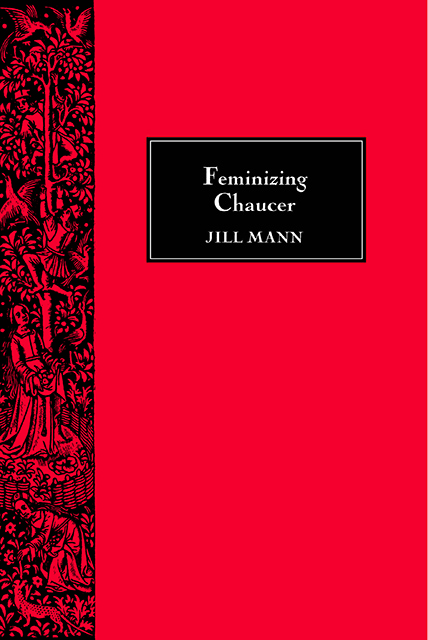Book contents
- Frontmatter
- Contents
- Dedication
- Preface to the 2002 Edition
- Preface
- Abbreviations
- Introduction
- 1 Women and Betrayal
- 2 Antifeminism
- 3 The Surrender of Maistrye
- 4 Suffering Woman, Suffering God
- 5 The Feminized Hero
- Conclusion
- Excursus: Wife-Swapping in Medieval Literature
- Chaucer Studies
- Bibliography
- Index
1 - Women and Betrayal
Published online by Cambridge University Press: 17 March 2023
- Frontmatter
- Contents
- Dedication
- Preface to the 2002 Edition
- Preface
- Abbreviations
- Introduction
- 1 Women and Betrayal
- 2 Antifeminism
- 3 The Surrender of Maistrye
- 4 Suffering Woman, Suffering God
- 5 The Feminized Hero
- Conclusion
- Excursus: Wife-Swapping in Medieval Literature
- Chaucer Studies
- Bibliography
- Index
Summary
N’y sey nat this al oonly for thise men,
But moost for wommen that bitraised be
Thorugh false folk …
(Troilus and Criseyde V 1779–81)Woman betrayed, woman betraying – these were the alternative images of woman with which Chaucer engaged at the outset of his writing career. The image of woman betrayed was associated first and foremost with the series of examples that make up Ovid's Heroides, the collection of fictional letters supposedly addressed by the women of classical story and legend to communicate their anguish and despair to the men who had deceived, deserted or simply neglected them. The Heroides, like other works of Ovid, was read and commented on as a school-text throughout the Middle Ages, and the names of these heroines – Dido, Phyllis, Ariadne, Penelope and the rest – became bywords for unhappy love in the writings of the period. But in uneasy contrast to this picture of woman as pathetic victim of male callousness and duplicity stands the picture of woman as temptress and destroyer of men. ‘A young woman is fickle and desirous of many lovers’ (‘Giovane donna, e mobile e vogliosa/È negli amanti molti’) is the warning that Boccaccio addresses to young men as the lesson to be learned from his story of Troiolo and Criseida; ‘she is immune to virtue and conscience, as perennially inconstant as a leaf in the wind’ (Filostrato VIII.30).
The contradictory images of woman betrayed and woman betraying do not always stand in simple opposition to each other. Ovid himself brings them into interesting relationship at the opening of the third and final book of his Ars Amatoria. The first two books have taught men how to seduce women, and how to hold their affections once won. In the third book, Ovid announces his intention to give parallel instruction to women, so that they may go into battle on equal terms with men. To those who might object ‘Why do you add poison to serpents, and open up the sheepfold to the ravenous she-wolf?’ (III 7–8), Ovid replies that not all women are bad, citing Penelope, Laodamia, Alcestis and Evadne as examples of selfless devotion to their husbands. What is more, he continues, men deceive women more often than women deceive men; he instances four of the women from his own Heroides – Medea, Ariadne, Phyllis and Dido – to make the point.
- Type
- Chapter
- Information
- Feminizing Chaucer , pp. 5 - 38Publisher: Boydell & BrewerPrint publication year: 2002



